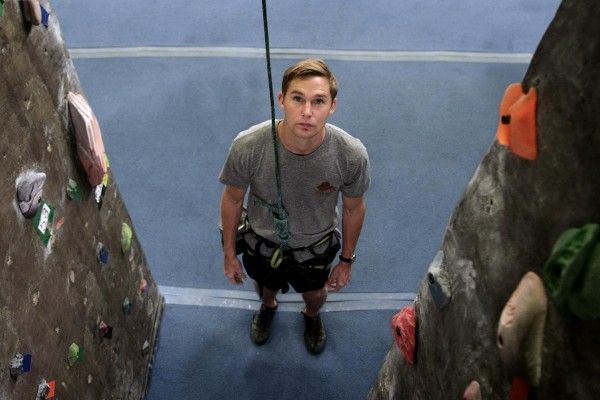Kilimanjaro is the weak slogan, "Life is what happens when you're making plans," extended to an 80 minute film. It's not insightful, emotional, and confuses "real" with "bland" (watching a guy discuss his vacation schedule with his boss is rarely riveting material). Instead, writer-director Walter Strafford takes a story with potential—a desire for a fresh start by taking on a challenging task—and fails to imbue it with emotion, personality, or drama. Instead, the movie is a series of clichés masquerading as characters, and a small story that feels insignificant rather than intimate. Despite a nice supporting turn by Chris Maruqette, Kilimanjaro shares the empty ambition of its protagonist, and not in a way that comes off as intentional.
Doug (Brian Geraghty) feels his life has becomes stuck in a rut, and the passion has gone out in his relationship with his longtime girlfriend, Claire (Alexia Rasmussen). After she moves out, he watches a special on Kilimanjaro, and decides to climb the mountain with his best friend, Mitch (Marquette). However, annoying obstacles keep popping up in Doug's path: he hurts his leg while training for the climb, he can't work out his vacation days with his boss (Jim Gaffigan), he's having a complicated post-breakup relationship with Claire, and more. Along the way, he also bumps into the effervescent Yvonne (Abigail Spencer), who for some reason might be attracted to the milquetoast Doug.
Strafford and Geraghty spend the majority of the movie trying to make Doug look small, but end up making him appear nondescript. We don't feel his frustrations because he doesn't seem to feel much of anything. Geraghty bows his head and mutters, but the character never expands from there (it's an approach that can work if you have comic timing, but the movie is too lethargic to try and work for laughs). Doug has no passion in his life despite having the admirable goal of climbing one of the world's largest mountains. He's working to make it a reality, and it could be a life-changing experience. But even if Kilimanjaro recognizes the climb as a pipe dream, the film is as timid as Doug in pointing out the futility of his quest.
The movie is beleaguered by so many elements we've seen before: the disapproving father (Bruce Altman), the mean boss, the peppy-unrealistic-possible-love-interest (not a "Manic Pixie Dream Girl" since Yvonne isn't a major presence in the story), and the snarky, shallow best friend. At least Marquette brings a little bit of bite to his performance, and it's refreshing to see a character who isn't simply frustrated, but at times openly hostile and comically bitter. Strafford tries to work on a believable post-break-up relationship between Doug and Claire, but they're bogged down in a meandering, lifeless plot where they get stuck in a cycle of agonizing over whether or not they should accept each other's phone calls.
Kilimanjaro should appeal to the universal adult experience about wanting to change your life, but it finds none of the emotions that come with the difficulty of that journey. Instead, the movie wants to be "realistic", and never realizes that small talk doesn't automatically manifest honest emotions, nor does it create compelling characters. We may share Doug's desires and frustrations, but we can't comprehend his almost complete lack of resentment. He's a leaf blowing in the wind, but without any of the zen charm. He's simply lifeless, and while one could argue that Strafford was making a cynical comment on the inability to pursue big dreams when faced with mundane complications, the lighthearted tone belies a film unwilling to challenge its audience in any way. Instead, Kilimanjaro is the cinematic form of Doug's blank stare, and the only thing that's funny is how a film that's divided into progressive stages—base camp, ascent, switchbacks, summit, and descent—goes absolutely nowhere.
Rating: D
Click here for all of our SXSW 2013 coverage. Click on the links below for my other reviews:


